- Home
- Catherine Jinks
The Road Page 6
The Road Read online
Page 6
At least the bullets are soft-nosed, Cyrene thought. At least if I hit the bastard, I’ll do a bit of damage.
And he pressed on cautiously, blinking the sweat out of his eyes.
‘I’m not hungry.’
‘You eat something, please.’
‘But I’m not hungry!’
‘Rose,’ said Linda, ‘if you don’t eat something now, you’re not getting anything in the car. All right? Don’t think you’re going to fill up on snacks, because I’m sick of it. You eat that toast. One piece of toast won’t kill you. Peter? Have you finished? Peter!’
Peter was reading The Stones of Amrach, for perhaps the eighth time. He jerked to attention, reluctantly extricating himself from the lair of the dreaded Molloon. Although he knew that the Fourth Eye would be found in the Molloon’s steaming stomach when Presprill clove its guts in twain, he was still eager to reach that transcendental moment before they had to leave the motel.
He wouldn’t be able to read in the car, because he got sick. So unless he finished the chapter now, he wouldn’t do it before lunchtime.
‘I don’t want any more,’ he assured his mother, preparing to plunge back into the pages of his novel. But Linda wouldn’t let him.
‘Have you cleaned your teeth?’ she asked. ‘Peter? Have you?’
‘Uh – no.’
‘Then go and do it. Now.’
Sighing, Peter rose from the bed to which he had been assigned. It was always chaos when the Fergusons travelled. There were five of them – two adults and three children, crammed into one car, one motel room, one restaurant booth. Linda and Noel generally shared a double bed wherever they stopped to sleep. If there were three singles in the room as well, everything was straightforward. But if there were two doubles and a single – or a double, two singles and a trundle or a foldaway – then the arguments would start. Louise resented sharing a double with Rosie. Rosie complained that she always had to sleep in the foldaway. Why couldn’t Peter, for once? Peter would point out that going to bed at half past eight was stupid. If he read his book in the bathroom, it wouldn’t bother Rosie, would it? It wouldn’t keep her awake. Whereupon Mum would reply that if she and Noel could go to bed at eight thirty, then so could Peter. Besides, they all had to get up early in the morning. Big day, tomorrow. An extra hour of sleep wouldn’t hurt.
Peter had to squirm past his mum to reach the bathroom. When he got there, he found his father wedged between the sink and the toilet bowl. Peter said: ‘I can’t clean my teeth, Mum, Dad’s shaving.’
‘It’s all right,’ said Noel. ‘Plenty of room.’ He shifted slightly, smiling through his shaving soap. ‘You can squeeze in, can’t you?’
‘I’ll wait,’ Peter replied. But his mother’s voice barred his exit. ‘Do it now,’ she insisted. ‘There’s a queue.’
‘Mum?’ It was Louise. ‘I can’t find my other red sock.’
‘Oh for God’s sake, Louise.’
‘I can’t find it!’
‘Have you looked?’
‘Yes, I’ve looked!’
‘You say you’ve looked, but I know I’ll come over there, and it’ll be sitting on top of everything, staring at me . . .’
‘It’s not, Mum!’
Peter sidled up to the vanity sink, plucked his toothbrush from the communal cup, and squeezed a gob of toothpaste onto its bristles – which already looked as if a dog had been chewing on them. He didn’t like travelling. Holidays could be fun, in some ways, but they could also be hell. At home, he slept in his own room. Louise and Rosie shared a big bedroom, but he had a little one all to himself, and he loved it. He loved to get away from everyone, retreating into his private domain, shutting the door on the endless yakking, the whirring appliances, the chattering television. Sometimes his family wore him out. They were so noisy, especially Rose. His mum maintained that he had never stopped talking either, when he was five, but Peter didn’t believe it. Rosie was a motormouth. Even Louise didn’t talk as much as Rose. Peter, who had quite clear memories of Louise when she was five (he had been eight at the time), knew for a fact that she had never burbled on like Rose. And if she hadn’t, then he certainly hadn’t. Because he was the quietest person in the family.
Peter spat out a mouthful of toothpaste. He mistimed it, and it hit his father’s wrist, but Noel – who had been rinsing off his razor – didn’t get mad. He rarely got mad about anything. Linda, on the other hand, got mad all the time. She was mad now, in fact, mad at Rosie, who had dropped a slice of Vegemite toast, face down, onto a pile of folded T-shirts.
‘Just sit!’ Linda snapped, addressing Rosie, as Peter and Noel emerged from the bathroom. ‘I told you not to wander around – now I’m going to have to wash that all over again!’
‘Sorry, Mum,’ Rosie muttered
‘Yes, well, it’s a bit late now, isn’t it?’
‘Lin,’ said Noel, in a gently reproachful voice, ‘it was an accident.’
Linda stiffened. ‘There wouldn’t have been an accident if she’d done what I told her to do!’ Bustling past her husband, she paused briefly, and added in a low voice (which Peter heard, nonetheless): ‘I’m the one who does the laundry around here, so I’m the injured party, all right?’
Then she marched into the bathroom, leaving Noel to exchange a quick glance with his son. The unspoken message from Noel was: be nice to your mother until we hit the road.
Linda was always in a bad mood when they had to pack up. She had said more than once that organising the Ferguson family was like trying to organise a bunch of headless chickens. Whenever they all had to go somewhere in the morning – whether it was to school, to netball, to swimming lessons or to work – Linda’s temper would begin to fray as she chivvied people in and out of the bathroom, hunted down clean shorts, searched for missing keys, wiped up spilled orange juice and made sandwiches. On holidays it was ten times worse, until they actually reached their destination. Then Linda would chill out on a deckchair, reading, while Noel took the children to butterfly farms, railway museums, marine parks and heritage trails.
There was a railway museum in Broken Hill, as it happened, and Noel had taken his kids to see that during their five-day visit. They had also toured a mine, ridden a camel, picnicked at Penrose Park and inspected the Line of Lode miners’ memorial. Together, Linda and Louise had lingered over displays of silver jewellery and shop windows full of cheap summer sandals. (Louise, as Noel often remarked, had a pink gene as big as a bus.) Together, Peter and Noel had spent several hours at the geo-centre, admiring chunks of crystalline rock and multicoloured ore. They had all dined out at the Musicians’ Club, trooped through a large number of art galleries and bought souvenirs at the Royal Flying Doctor Service gift shop.
But the real purpose of the trip had been to visit Noel’s Aunt Glenys. She was seventy-three years old and lived on Wolfram Street, in a little house made of corrugated iron. Noel had spent a lot of his childhood with Auntie Glenys (Peter didn’t know why, exactly), so every two years the Fergusons would pile into their car and drive up from Melbourne to Broken Hill for a family get-together. They would make a point of taking Glenys out to dinner one night. They would crowd into her tiny kitchen, kiss her powdery cheek, listen to her stories about the ladies at the club and insist on washing up all the dirty cups and plates. (At least, Linda would insist; Peter and Louise were less enthusiastic.) Noel would make a point of chatting to Glenys for at least two hours every day, morning and evening. He would sit at the kitchen table with her, sipping a cup of tea, while Linda used Glenys’s washing machine and Rosie followed Louise around the back garden (bickering about a set of coloured pencils perhaps) and Peter sat in the living room poring over Glenys’s set of Reader’s Digest condensed books. Peter enjoyed those books. He had read The Stepford Wives during their last visit to Broken Hill, and The Boys from Brazil during this visit. But he had been unable to finish A Tree Grows in Brooklyn. He hadn’t had time.
Peter was like his mother, in that respect; the
y both liked to wallow in books. He also had his mother’s green eyes and good teeth. But for the most part he resembled Noel. They were both skinny, tall and pale, with bony joints and soft, measured voices. They both had heavy dark hair and an abiding love of factual information. Peter was more passionate about The Lord of the Rings than Noel was, and couldn’t drum up much enthusiasm for his father’s chief interest, which was electronic communication. (Noel worked for Telstra after all.) But on the whole, father and son were two of a kind.
That was why they both responded in the same way during the frantic, last-minute preparations that always preceded the family’s departure from any motel. While Linda issued sharp commands, and Rosie whined, and Louise argued, Peter and Noel tiptoed around, trying not to catch anyone’s eye. Noel loaded their suitcases into the boot, returned the room keys and paid the bill. Peter checked under the beds, in the drawers and behind the shower curtain for any forgotten possessions. They did their jobs, in other words. And they both heaved silent sighs of relief when the car doors finally slammed, signalling the start of their journey.
‘Right,’ Linda said. ‘Have we got everything? Rose – have you got your Barbie?’
‘Yes, I have.’
‘Louise, did you remember to put away all your pens and things?’
‘Yes.’
‘Peter, did –’
‘I checked the drawers, I checked the cupboards and I checked under the beds.’
‘Did anyone check the bathroom?’
‘I did that too.’
‘All right.’ Linda slumped against her seat, as if all the tension was draining out of her. ‘Let’s go then.’
Noel cocked his head. ‘Sure?’ he asked.
‘Sure.’
‘Everyone got their seatbelts on?’
‘Yes,’ the three kids chorused.
‘All right, then.’ Noel put his foot down, and their Nissan Pulsar slowly pulled away from the Miners Lamp Motor Inn. ‘Off to Mildura we go.’
By ten fifteen they were heading south, down the Silver City Highway.
CHAPTER 4
Nathan ran. He ran down the road and through the gate, past the peppercorn tree and the rusty oil drum, up the steps and into the house. The screen door banged behind him. He closed the front door, which was made of solid wood, by thrusting his whole body against it. Then he hung from the doorknob, panting and crying.
He didn’t know what to do. Cyrene had told him to hide – hide and wait. But where? In the house? There weren’t many good hiding places. Under the bed was too obvious. The kitchen cupboards were full. The wardrobe? He could try the wardrobe. Or behind the wardrobe – he might be able to slide in there.
Nathan scuttled down the hall to the bedroom where he and his mother had slept. He saw her good shoes on the floor, her jumper on the bed, her make-up on the bedside table. The whole room smelled of her, and the smell brought fresh tears to his eyes. He began to sob as he made his way over to the wardrobe, blindly groping with outstretched hands. But he knew he shouldn’t cry; he knew that someone might hear him if he did. So he scrubbed at his face, swallowed a shuddering hiccup, and tried to squeeze into the gap between the wall and the back of the wardrobe. It was too narrow. He scraped himself painfully against a nail, which caught on his sleeve, then pulled away and considered the wardrobe’s interior. A lot of his mum’s stuff was hanging there – some of his own too – but he could probably clear enough space. He was just beginning to push aside a few dangling sundresses when he heard the faint but unmistakable sound of another shot.
That shot cleared his head like a blast of wind. He knew instantly that the wardrobe was no good. It was too easy to find. It was the first place his stepfather would look. Under the bed, in the wardrobe, behind the door – his stepfather would look in all those places, one by one. He would work his way through the whole house, getting warmer and warmer, while Nathan crouched, sweating, under a pile of towels, listening to the floorboards creak.
Nathan fought to muffle his sobs, shaking from head to toe. He was so scared. He wanted his mother. He didn’t know what to do, and his nose was running and he didn’t have a handkerchief. The garage might be safe. There was an old bedspread in the garage, and a whole lot of cans and wood and power tools. Maybe he could hide under the bedspread. But Cyrene had warned him not to play in the garage, because there were nails and things. Spiders. Poisons. Cyrene had made him promise not to go in the garage.
Nathan thought: Cyrene will save my mum.
He crept back down the hall and into the kitchen. The clock on the wall went tick, tick, tick. The fridge rumbled. Keeping low, he went to the window and peered through it, allowing only one eye to clear the sill. He saw the front yard. The fence. The gate.
The road.
There was no one on the road. Soon, perhaps, there would be: a man, walking with a gun. Would it be Cyrene, or . . .?
Nathan pressed the heels of his hands into his eye sockets. No, no, no. It wouldn’t be someone else. Nathan refused to consider any other possibility. Nevertheless, he realised that he couldn’t just wait here and watch the man slowly come for him. His whole mind, his whole being, veered away from the very prospect.
And suddenly he remembered.
When he uncovered his eyes, his vision was splotched and blurred. He blinked rapidly, scrambling to his feet; his thoughts were now fixed on a single image, and his reasoning powers were working only on a subconscious level. He knew that he would be safe if he headed west, but not why – he didn’t logically deduce that, in running away from the house towards the ridge, he would be screened from the sight of anyone approaching the house from the east. He didn’t consider that a search of the house would give him even more time to escape, as long as nobody peered through the blinds in his mother’s bedroom, or looked through the bathroom window. He simply understood that if he moved now, quickly, in the right direction, he might have a chance.
So he began to run. He ran out the back door, down the steps, past the Hills hoist. He hurtled along until he came to the wreck of the Holden ute; didn’t bother to open the gate. He simply surged up and over it, hitting the ground with a thump. He ran and stumbled and kept on running, winding his way through the low bushes, the clumps of grass, the odd scraps of rubbish, none of which afforded him any concealment. In his purple top and lime-green shorts he was as visible as a lighthouse beacon, though he didn’t know it. The thought never crossed his mind. Instead he was thinking about the ridge ahead of him, and the pain in his chest, and the blood thumping in his ears, and the sweat trickling down his face. He was thinking about the bushes that whipped his ankles as he rushed by them. He was thinking about getting there . . . getting there . . .
He didn’t stop to wonder if Cyrene would be able to find him. Cyrene knew about the hole, and would come to it eventually. But he did wonder how far a gun could shoot. He was so far from the house, but he didn’t know . . . could a bullet still reach him, from way back there?
Was someone already watching him from the bathroom window?
‘I spy with my little eyes something beginning with “C”.’
Rose pronounced the letter phonetically, with a hard edge; she was still more comfortable with the sounds of letters than with their actual names.
‘Cloud,’ said Peter, in a bored voice.
‘No!’ Rose screamed. ‘No, you can’t say it!’
‘Peter.’ Linda half turned in her seat. She flashed him a reproving look. ‘You know how this works.’
Peter sighed. After an hour in the car, he was already desperate to get out. So far, they had sung about fifteen songs (mostly nursery rhymes), shared one apple and a packet of corn chips, listened to Louise’s latest story about her friend Jemima’s stupid dog – which got hit by traffic at regular intervals – and played a ten-minute game of ‘I Spy’ in accordance with the unique rules laid down by Rose. These rules decreed that when it was Rose’s turn, no one was allowed to guess her word until at least two people had already
got it wrong. If anyone challenged Rose’s right to play the game differently from everybody else, Rose would immediately erupt, and Linda would say in long-suffering tones: ‘For God’s sake, does it matter? Just do what she wants, and let’s have a little peace.’
There was a CD player in the car, but music wasn’t permitted any more. There had been too many arguments about what should be played, when, and for how long. They did have a walkman with headphones, which Rose didn’t much like, but Peter and Louise had to share it – twenty minutes for Louise, twenty minutes for Peter – and right now it was in Louise’s custody. She was sitting over by the other window, one bony brown knee drawn up to her chin, trying to stick heart-shaped decals onto her painted toenails as her head bobbed up and down in time to the music that was pouring into her ears. Stupid music – Britney Spears, no less. The same song over and over again, its tinny beat leaking out of the headphones and bothering Peter like a mosquito’s whine. He tried to ignore it.
‘All right, all right,’ he said. ‘Um – “C”. Okay. Something beginning with “C”.’ Gazing out the window, he tried to spot another object that would satisfy Rose. But it was difficult, because there wasn’t much to see. Dirt? No. Bushes? No. Power poles? No. The road was slightly raised above ditches on either side; parallel to the ditches there were white posts, evenly spaced, with red reflector patches on them. A line of trees marked the passage of a creek somewhere off to the right.

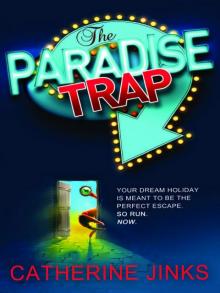 The Paradise Trap
The Paradise Trap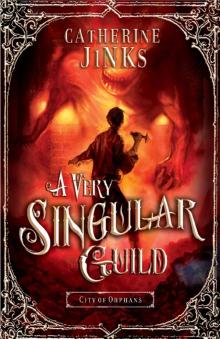 A Very Singular Guild
A Very Singular Guild Eloise
Eloise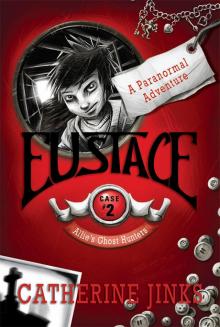 Eustace
Eustace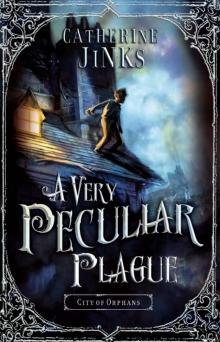 A Very Peculiar Plague
A Very Peculiar Plague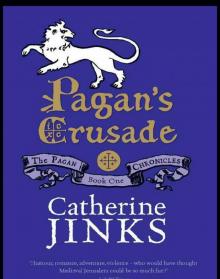 Pagan's Crusade
Pagan's Crusade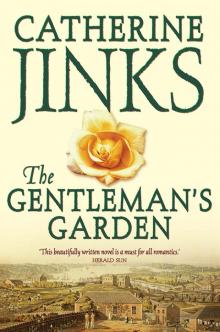 The Gentleman's Garden
The Gentleman's Garden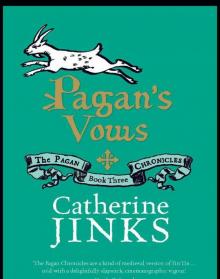 Pagan's Vows
Pagan's Vows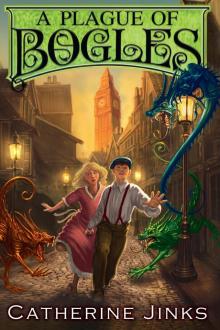 A Plague of Bogles
A Plague of Bogles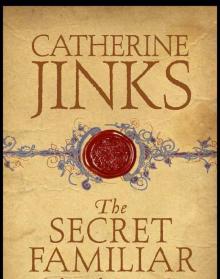 The Secret Familiar
The Secret Familiar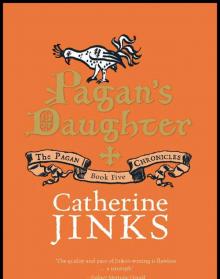 Pagan's Daughter
Pagan's Daughter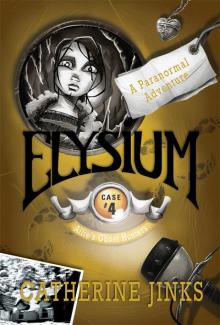 Elysium
Elysium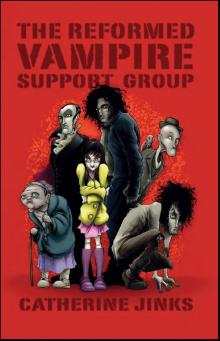 The Reformed Vampire Support Group
The Reformed Vampire Support Group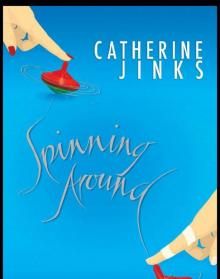 Spinning Around
Spinning Around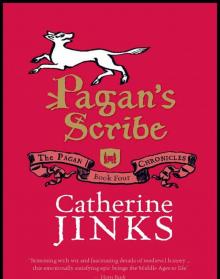 Pagan's Scribe
Pagan's Scribe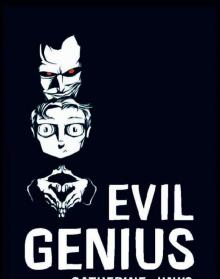 Evil Genius
Evil Genius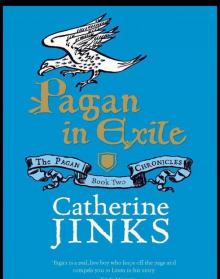 Pagan in Exile
Pagan in Exile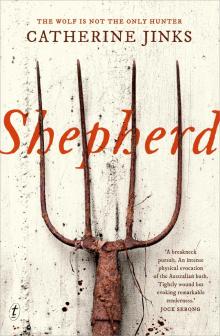 Shepherd
Shepherd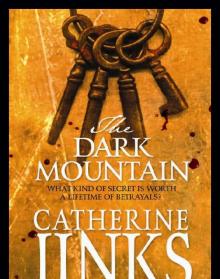 The Dark Mountain
The Dark Mountain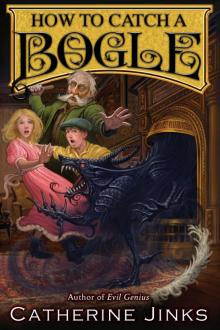 How to Catch a Bogle
How to Catch a Bogle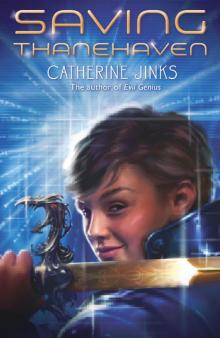 Saving Thanehaven
Saving Thanehaven The Genius Wars
The Genius Wars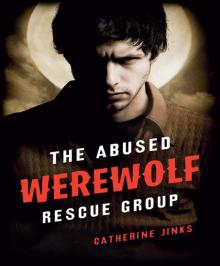 The Abused Werewolf Rescue Group
The Abused Werewolf Rescue Group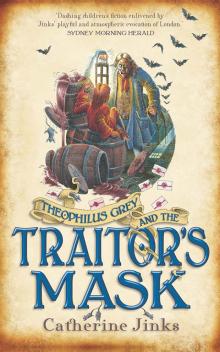 Theophilus Grey and the Traitor's Mask
Theophilus Grey and the Traitor's Mask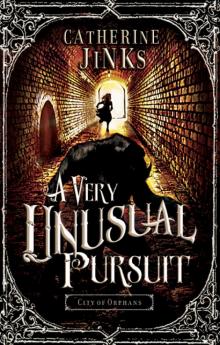 A Very Unusual Pursuit
A Very Unusual Pursuit Genius Squad
Genius Squad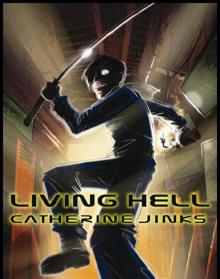 Living Hell
Living Hell The Road
The Road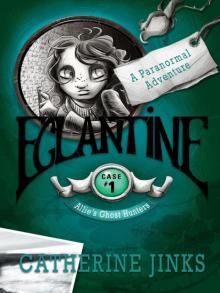 Eglantine
Eglantine